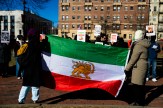Afghanistan, WikiLeaks under a microscope
Last Sunday, WikiLeaks, an international organization that publishes confidential documents, released a six-year archive of some 92,000 classified military reports on the war in Afghanistan. The secret documents have rekindled debate over financing the war among administration officials, members of Congress and the general public, prompting the White House to defend its military strategy. Dan Kennedy, assistant professor of journalism at Northeastern, has written extensively about the WikiLeaks documents in his Media Nation blog, and in the British national daily newspaper The Guardian. We asked him to assess the impact of the documents and WikiLeaks’ own impact as an information source.
How does the release of the Afghanistan war logs compare to the release of the Pentagon Papers?
The Pentagon Papers were of enormous significance, as they showed our own government had been skeptical that we could succeed in Vietnam right from the earliest days of the war. The Afghanistan documents are raw field reports, and so far they mainly confirm what we already know.
Still, we shouldn’t underestimate their importance. The war in Afghanistan is losing public support, and the documents contribute to a sense that the situation is deteriorating. Even though the most recent documents date back to December 2009, I don’t think many people believe things have improved since then.
How does their largely negative portrayal of the war affect the Obama administration’s military strategy in Afghanistan?
The documents contribute to a sense that what we are fighting for isn’t worth the price in American lives. Our supposed allies in Pakistan are double-dealing with the Taliban, our allies in Afghanistan are corrupt and ineffective, and we are killing innocent civilians because of chaos and confusion on the ground.
Coupled with the recent resignation of General Stanley McChrystal over his disrespect for the president and the vice president, the documents are further evidence that the Obama administration’s Afghanistan policy is in utter disarray.
Why would someone leak these particular documents?
Without knowing who leaked the documents, we can’t really discern their motivation. But it could well be that the leaker is a person very much like Daniel Ellsberg, who provided the Pentagon Papers to The New York Times and The Washington Post — that is, a governmental insider who is appalled by the situation in Afghanistan and Pakistan, and who wants to expose it in order to force change, or possibly even withdrawal.
I hope we learn who the leaker is so that we can get some answers as to what motivated him or her to act.
WikiLeaks founder Julian Assange has asserted that members of his team might get “blood on our hands” for releasing confidential documents. How should WikiLeaks balance the public’s right to know with the safety of the American people?
Although WikiLeaks is not a traditional news organization, it is engaged in journalism of a sort, even if it’s just a matter of gathering information. And every responsible news organization must balance the right to know with legitimate national-security considerations.
Assange said WikiLeaks has withheld 15,000 documents until the names of individuals who would be at risk are redacted. I think that shows good faith on his part. And let’s not forget that the Times and the Post themselves have been accused of endangering national security over the years, from the Pentagon Papers right through their more recent reporting on the Bush administration’s anti-terrorism efforts.
Invariably we have seen that national-security concerns are overblown. We are better off knowing than not knowing.
WikiLeaks doesn’t consider itself part of the press. What is its role in politics and journalism?
In a recent profile in The New Yorker, Assange made it clear that he is more interested in having a political impact than he is in practicing journalism. Essentially he is a political activist who uses a tool of journalism — information — in order to advance his antiwar views.
A project like WikiLeaks couldn’t have existed before the Internet. I think in many ways Assange himself is still trying to figure out what WikiLeaks’ role should be.
What’s the relationship like between the mainstream press and WikiLeaks?
As recently as this past spring, the relationship between the traditional media and WikiLeaks was more adversarial than not. Assange was heavily criticized for releasing a highly edited version of a video that showed a U.S. Apache helicopter firing on Iraqi civilians.
I think Assange learned from that experience. By making the Afghanistan war logs available to The New York Times, The Guardian and Der Spiegel a month ahead of time, he gave professional journalists a chance to vet, sort and craft a narrative out of confusing, sometimes contradictory field reports. The result is that WikiLeaks is now seen as a more credible source of information than had previously been the case.





